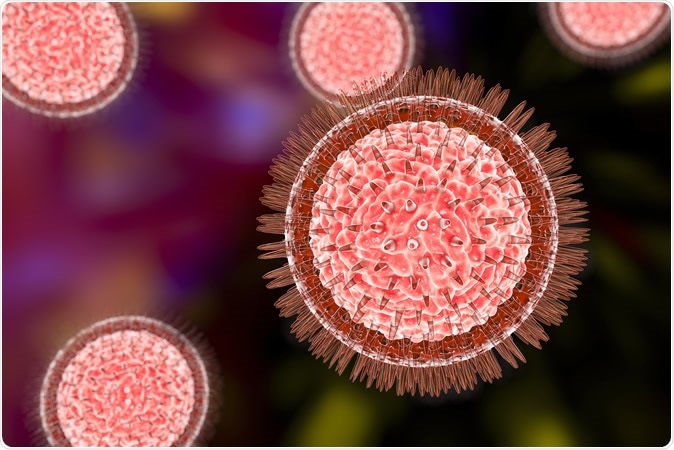Walter Reed army institute of research has shown that a new vaccine against the Zika virus could be effective against both Zika and dengue virus. The study titled, “Potent Zika and dengue cross-neutralizing antibodies induced by Zika vaccination in a dengue experienced donor,” in the latest issue of the journal Nature Medicine.
A study looking at the potential benefits of the Zika vaccine in the three phase 1 trials was also published a couple of years back. It was titled, “Preliminary aggregate safety and immunogenicity results from three trials of a purified inactivated Zika virus vaccine candidate: phase 1, randomised, double-blind, placebo-controlled clinical trials,” and was published in the journal Lancet. The researchers have successfully conducted three Phase 1 human clinical trials with the new ZIKV vaccine and it has been found to be safe and effective in protecting the vaccinated individual from Zika infection.

Zika virus. Credit: Kateryna Kon / Shutterstock
The team of researchers revealed that this experimental Zika virus vaccine was capable of boosting an immunity provided by flavivirus by producing cross-neutralizing antibody responses against dengue as well as Zika virus. The team explained that flavivirus family includes viruses such as Zika, dengue, yellow fever, Japanese encephalitis and West Nile viruses.
Antibodies are markers that a vaccine is effective say the researchers. When these antibodies are generated, they are capable of killing the incoming Zika and dengue viruses, explain the researchers. This protects the individual receiving the vaccine from the viruses, they added.
For this study they looked at a volunteer who had earlier experienced dengue. He was part of the Phase 1 clinical trial of the WRAIR-developed Zika vaccines. This vaccine is an inactivated vaccine that has been purified for use. After administration of the new vaccine, the team found that this individual developed an antibody called the MZ4. This potent antibody then went on to neutralize not only Zika virus but also dengue virus serotype-2 strain. They also studied the effects of this antibody on the lab mice with the infection model and found that it was effective in the experimental animals as well.
Dr. Kayvon Modjarrad, study leader for the Lancet study and for the U.S. Army Zika vaccine program and director of Emerging Infectious Diseases Branch at WRAIR said in a statement, “Rapid-onset countermeasures are needed to protect military personnel, travelers and residents in areas where emerging infections such as Zika and dengue viruses are already widespread and expanding.” He added, “These results demonstrate the potential for MZ4 to be part of the prevention toolbox for these diseases.”
There were several volunteers in the clinical trial for the vaccine, explain the researchers. Of these other volunteers had never been exposed to dengue virus before. The individual, who had had dengue before, showed a markedly significant rise in the antibody level following the vaccination with a single dose of the experimental ZPIV vaccine. The antibodies could then kill both Zika and dengue viruses. Among those who had never had dengue before, two doses of the new experimental Zika vaccine led to development of similar levels of antibodies that could fight the Zika virus but did not have the capacity to fight off Dengue virus.
Dr. Shelly Krebs, a B cell researcher at WRAIR, one of the senior authors of the study said, “These new findings indicate that an effective Zika vaccine could both boost dengue virus immune responses and generate potent Zika neutralizing antibodies that might have unique potential as a prevention tool in regions where both dengue and Zika are prevalent.”
At present the Phase 1 clinical trials for the experimental Zika vaccine are being conducted in Puerto Rico because of the higher prevalence of the flavivirus infections in that region. The team explained that when they used the vaccine in individuals who had earlier been exposed to one of the flaviviruses, they developed antibodies that could fight off two different viruses such as in this case. They added that this new vaccine ZIKV thus could be extra beneficial for people living in regions which are endemic to not only Zika but also other flavivirus infections.
Zika virus infections are generally not severe but among pregnant women, this infection can lead to severe birth defects in the new born baby including microcephaly and severe mental retardation. As on now, like most of the other flavivirus infections, there is no known cure for Zika virus infection and over the past few years there has been research in the area of vaccination against this infection.
Journal reference:
Dussupt, V., Sankhala, R.S., Gromowski, G.D. et al. Potent Zika and dengue cross-neutralizing antibodies induced by Zika vaccination in a dengue-experienced donor. Nat Med (2020). https://doi.org/10.1038/s41591-019-0746-2